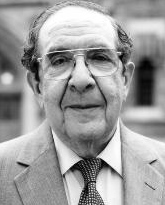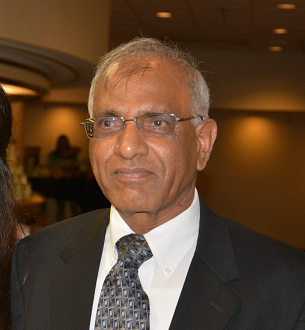Related Research Articles

Grigory Isaakovich Barenblatt was a Russian mathematician.
Solid mechanics is the branch of continuum mechanics that studies the behavior of solid materials, especially their motion and deformation under the action of forces, temperature changes, phase changes, and other external or internal agents.

Ronald Samuel Rivlin was a British-American physicist, mathematician, rheologist and a noted expert on rubber.
Bernard Budiansky was an American scholar in the field of applied mechanics, and made seminal contributions to the mechanics of structures and mechanics of materials. He was a recipient of the Timoshenko Medal.

John Douglas Eshelby FRS was a scientist in micromechanics. He made significant contributions to the fields of defect mechanics and micromechanics of inhomogeneous solids for fifty years, including important aspects of the controlling mechanisms of plastic deformation and fracture.
John W. Hutchinson is the Abbott and James Lawrence Research Professor of Engineering in the School of Engineering and Applied Sciences at Harvard University. He works in the field of solid mechanics concerned with a broad range of problems in structures and engineering materials.
Raymond David Mindlin was an American mechanical engineer, Professor of Applied Science at Columbia University, and recipient of the 1946 Presidential Medal for Merit and many other awards and honours. He is known as mechanician, who made seminal contributions to many branches of applied mechanics, applied physics, and engineering sciences.
Paul Mansour Naghdi was a professor of mechanical engineering at University of California, Berkeley.

Thomas Joseph Robert Hughes is a Professor of Aerospace Engineering and Engineering Mechanics and currently holds the Computational and Applied Mathematics Chair (III) at the Oden Institute at The University of Texas at Austin. Hughes has been listed as an ISI Highly Cited Author in Engineering by the ISI Web of Knowledge, Thomson Scientific Company.
Daniel Charles Drucker was American civil and mechanical engineer and academic, who served as president of the Society for Experimental Stress Analysis in 1960–1961, as president of the American Society of Mechanical Engineers in the year 1973–74, and as president of the American Academy of Mechanics in 1981–82.
James Robert Rice is an American engineer, scientist, geophysicist, and Mallinckrodt Professor of Engineering Sciences and Geophysics at the Harvard John A. Paulson School of Engineering and Applied Sciences.

Kenneth Langstreth Johnson FRS FREng was a British engineer, Professor of Engineering at the University of Cambridge from 1977 to 1992 and a Fellow of Jesus College, Cambridge. Most of his research was in the areas of tribology and contact mechanics.

Junuthula N. Reddy is a Distinguished Professor, Regent's Professor, and inaugural holder of the Oscar S. Wyatt Endowed Chair in Mechanical Engineering at Texas A&M University, College Station, Texas, USA.[1] He is an authoritative figure in the broad area of mechanics and one of the researchers responsible for the development of the Finite Element Method (FEM). He has made significant seminal contributions in the areas of finite element method, plate theory, solid mechanics, variational methods, mechanics of composites, functionally graded materials, fracture mechanics, plasticity, biomechanics, classical and non-Newtonian fluid mechanics, and applied functional analysis. Reddy has over 620 journal papers and 20 books and has given numerous national and international talks. He served as a member of the International Advisory Committee at ICTACEM, in 2001 and keynote addressing in 2014.[2][3]
Morton Edward Gurtin was an American mechanical engineer who became a mathematician and mathematical physicist. He was an emeritus professor of mathematical sciences at Carnegie-Mellon University, where for many years he held an endowed chair as the Alumni Professor of Mathematical Science. His main work is in materials science, in the form of the mathematical, rational mechanics of non-linear continuum mechanics and thermodynamics, in the style of Clifford Truesdell and Walter Noll, a field also known under the combined name of continuum thermomechanics. He has published over 250 papers, many among them in Archive for Rational Mechanics and Analysis, as well as a number of books.

Jan Drewes Achenbach was a professor emeritus at Northwestern University. Achenbach was born in the northern region of the Netherlands, in Leeuwarden. He studied aeronautics at Delft University of Technology, which he finished with a M.Sc. degree in 1959. Thereafter, he went to the United States, Stanford University, where he received his Ph.D. degree in 1962. After working for a year as a preceptor at Columbia University, he was then appointed as assistant professor at Northwestern University.

Marco Amabili is a professor who holds the Canada Research Chair in Vibrations and Fluid-Structure Interaction, Department of Mechanical Engineering at McGill University, Montreal, Québec, Canada.
Albert Edward Green was a British applied mathematician and research scientist in theoretical and applied mechanics.

Max Erich (Eric) Reissner was a German-American civil engineer and mathematician, and Professor of Mathematics at the Massachusetts Institute of Technology. He was recipient of the Theodore von Karman Medal in 1964, and the ASME Medal in 1988.

Isaac Elishakoff is a Distinguished Research Professor in the Ocean and Mechanical Engineering Department in the Florida Atlantic University, Boca Raton, Florida. He is a figure in the area of mechanics. He has made several contributions in the areas of random vibrations, solid mechanics of composite material, semi-inverse problems of vibrations and stability, functionally graded material structures, and nanotechnology.
Martin Ostoja-Starzewski is a Polish-Canadian-American scientist and engineer, a professor of mechanical science and engineering at the University of Illinois Urbana-Champaign. His research includes work on deterministic and stochastic mechanics: random and fractal media, representative elementary volume in linear and nonlinear material systems, universal elastic anisotropy index, random fields, and bridging continuum mechanics to fluctuation theorem.
References
- ↑ "Ogden, Prof. Raymond William" . Who's Who (online ed.). A & C Black. 2017. doi:10.1093/ww/9780199540884.013.245269 . Retrieved 22 January 2018.(Subscription or UK public library membership required.)
- 1 2 Raymond Ogden at the Mathematics Genealogy Project
- 1 2 3 4 5 "Raymond Ogden". London: Royal Society. One or more of the preceding sentences may incorporate text from the royalsociety.org website where "all text published under the heading 'Biography' on Fellow profile pages is available under Creative Commons Attribution 4.0 International License." "Royal Society Terms, conditions and policies". Archived from the original on 20 February 2016. Retrieved 9 March 2016.
{{cite web}}: CS1 maint: bot: original URL status unknown (link) - ↑ "Professor Ogden awarded the Timoshenko Medal". Archived from the original on 17 November 2017. Retrieved 16 November 2017.